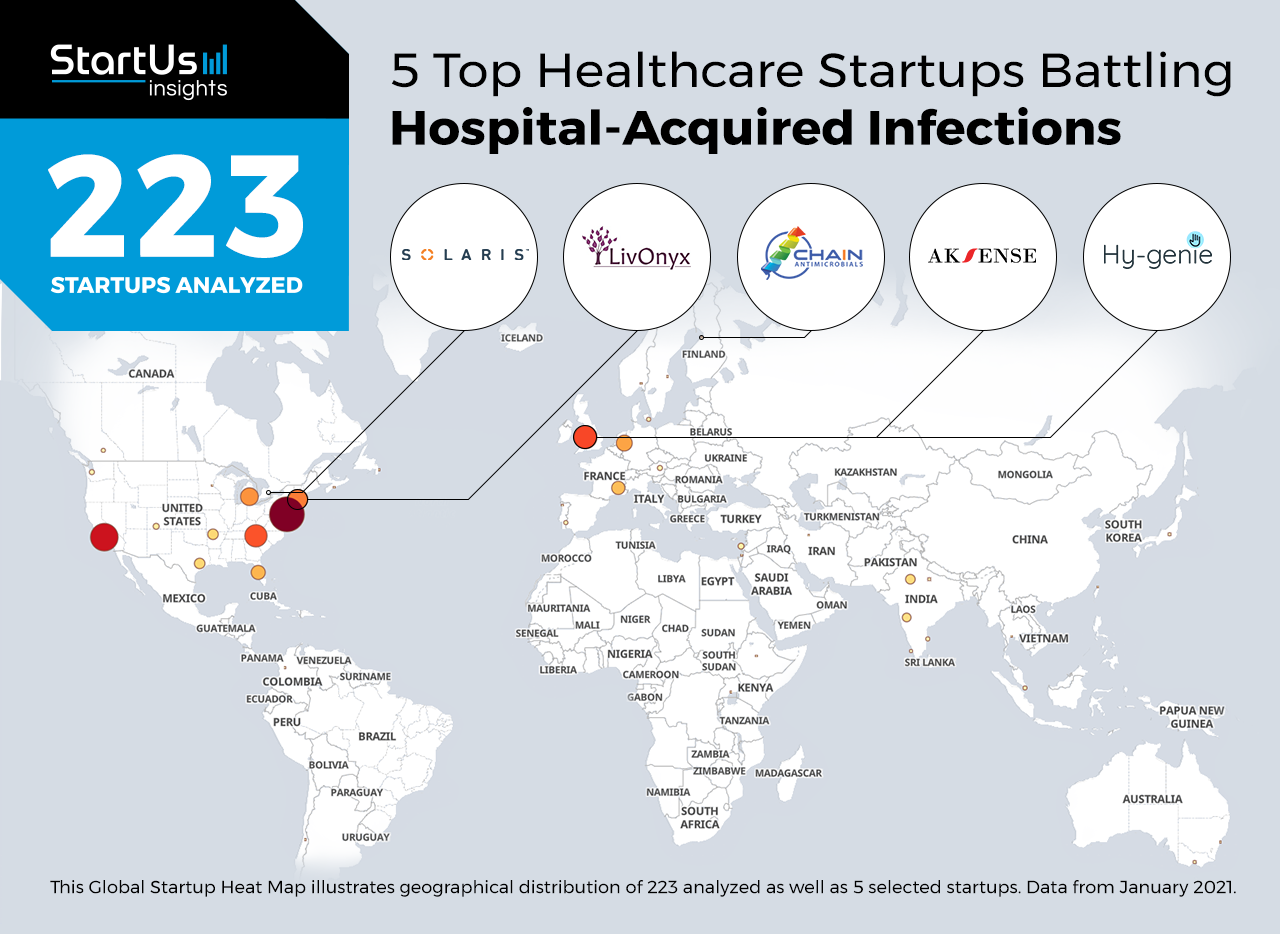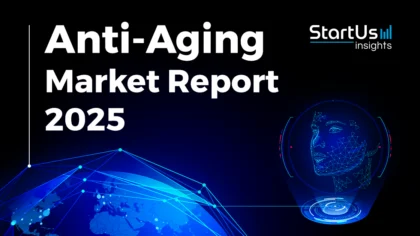Accelerate Productivity in 2025
Reignite Growth Despite the Global Slowdown
Staying ahead of the technology curve means strengthening your competitive advantage. That is why we give you data-driven innovation insights into the healthcare industry. This time, you get to discover 5 hand-picked startups battling hospital-acquired infections.
Global Startup Heat Map: 5 Top Startups Battling Hospital-Acquired Infections
The 5 healthcare startups you will explore below are chosen based on our data-driven startup scouting approach, taking into account factors such as location, founding year, and relevance of technology, among others. This analysis is based on the Big Data & Artificial Intelligence (AI)-powered StartUs Insights Discovery Platform, covering over 1.3 million startups & scaleups globally.
The Global Startup Heat Map below highlights the 5 startups battling hospital-acquired infections our Innovation Researchers curated for this report. Moreover, you get insights into regions that observe a high startup activity and the global geographic distribution of the 223 companies we analyzed for this specific topic.
Aksense – Point of Care Diagnosis
There is an increasing incidence of multidrug-resistant (MDR) pathogens causing hospital-acquired infections or healthcare-associated infections. Accurate and early diagnosis is crucial to decide the appropriate treatment to prevent HAI. To this end, biosensors enable rapid diagnosis in a cost-effective and easy manner, especially for point of care testing (POCT).
British startup Aksense develops a rapid blood test using a portable electronic biosensor to detect hospital-acquired infections. Aksense measures the host response against the pathogen with proteomic and electrochemical sensing technology. The point of care biosensor provides quick diagnosis for infections caused by Escherichia coli, Acinetobacter baumannii, and Pseudomonas aeruginosa, as well as Klebsiella pneumonia, Staphylococcus aureus, and Enterococcus spp. infections. Moreover, Aksense reduces diagnosis timelines for medical testing from days to minutes.
Hy-genie – Hand Hygiene Management System
Hundreds of thousands of people suffer from HAIs every year. This is why the monitoring of spreading bacteria in hospitals, surgical centers, nursing homes, rehab facilities, ambulatory clinics, and other healthcare-related settings is a key requisite. Besides, a hospital infection management system provides the basis for strategic planning to prevent such infections in the first place, enables supervision of potential epidemics, and makes it easy to compare performance at different units in a healthcare facility.
Hy-giene is a startup from the United Kingdom, specializing in an active monitoring system that allows hospitals to detect the usage of hand hygiene stations, helps reduce HAIs, and improves patient safety. The hygiene device features unbiased real-time data analysis and usage tracking, in line with the National Health Service (NHS) standards. Hy-genie significantly improves compliance to reduce the risk of patients developing HAIs.
LivOnyx – Hand Disinfection System
The COVID-19 pandemic has further increased the need for regular disinfection, especially for hand hygiene. Hand hygiene plays a crucial role in the prevention of hospital-acquired infections, but the compliance of washing them with soap and water or using alcohol rubs remains low. Automated disinfection systems have evolved to meet the specialized needs of hospitals to maintain an infection-free environment.
The US-based startup LivOnyx creates an Automated Rapid Hand Disinfection device using proprietary technology. The startup’s patented thinSpray system inactivates clinically-relevant resistant bacteria such as MRSA and VRE in 3-4 seconds. The hand hygiene solution is quick & easy to use, leaves the hands dry, optimizes workflow around the patient, and eliminates clinically important pathogens, including C. difficile spores.
Chain Antimicrobials – Antimicrobial-Coated Medical Devices
The transmission of hospital-acquired infections increases due to the improper sterilization of medical equipment. Conventional methods of thermal, chemical, and manual sterilization fall short of providing high resistance to HAIs. Antibody coatings, on the other hand, are scientifically proven to prevent the microbial growth of germs, parasites, and bacteria, among other disease-causing pathogens.
Finnish startup Chain Antimicrobials manufactures highly effective, ISO-compliant antimicrobial-coated catheters to prevent HAIs. Catheter-associated urinary tract infections (CAUTIs) are among the most common HAIs globally. That is why the startup’s antimicrobial peptides are coated on catheters to prevent bacterial and fungal infections. The antimicrobial peptide coating prevents biofilm formation, thus preventing CAUTIs. The peptide molecule shows efficacy against broad-spectrum antimicrobials.
Solaris – Robotics
Robotics are revolutionizing various industries including the medical sector. Advances in robotics find applications in surgeries, telepresence, nursing assistants, and even sterilization. Especially in the current pandemic, robotic solutions that can disinfect large surfaces fast are in high demand. Compare to conventional methods, robotic disinfectants principally block the transmission chain as they operate without human interference.
Canadian startup Solaris builds Lytbot, a mobile robot that utilizes germicidal UV-C light and micro-organism disintegration technologies, called Pulsed UV, to kill pathogens. The 254 nm germicidal UV-C light works by creating thymine dimers in a pathogen cell rendering the cell unable to perform its cellular functions. All bands of light from 100 nm to 1.000 nm cause the disintegration of microorganisms. As a result, Lytbot complements traditional disinfecting methods to eliminate as many harmful bacteria and pathogens as possible from surfaces in any environment.
Discover more Healthcare startups
To keep you up-to-date on the latest technology and emerging solutions, we provide you with actionable innovation intelligence – quickly and exhaustively. You can download our free Healthcare Industry Report and discover new business opportunities or save your time & let us look into your areas of interest. We provide you with an exhaustive overview of new startups, scaleups & emerging technologies that matter to you.








